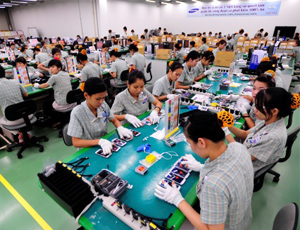Samsung to Build US$1 Billion Plant in Vietnam
 HCMC – Vietnam continues to strengthen its relationship with Samsung. On July 2, Bac Ninh province granted an investment license to Samsung Display Co. Ltd for its US$1 billion project in the Yen Phong Industrial Park. This investment comes on the back of multiple large scale investments by the South Korean tech giant.
HCMC – Vietnam continues to strengthen its relationship with Samsung. On July 2, Bac Ninh province granted an investment license to Samsung Display Co. Ltd for its US$1 billion project in the Yen Phong Industrial Park. This investment comes on the back of multiple large scale investments by the South Korean tech giant.
The new plant will supply small displays for Samsung’s smartphones and tablet computers and is expected to be the largest Samsung factory of its kind in the world.
 RELATED: Dezan Shira & Associates’ Pre-Investment, Market Entry Strategy Advisory Services
RELATED: Dezan Shira & Associates’ Pre-Investment, Market Entry Strategy Advisory Services
Samsung has been able to negotiate exceedingly favorable conditions from the Vietnamese government for the building of this new factory – Vietnam is keen to attract more high-technology companies. According to the company’s investment license, Samsung will receive numerous concessions from Bac Ninh province, these include:
- The province will use its own funds to support the construction of the Yen Phong Industrial Park;
- The Provincial People’s Committee has approved a 50 percent income tax rate reduction for the company for three years after the expiration of the initial four-year tax exemption and nine-year 50 percent tax reduction;
- A 50 percent Land Use Fee (46.28 ha), which is about VND286 billion (US$13.5 million) (Samsung received similar financial support for its previous plant);
- Bac Ninh province will also cover part of the worker’s training costs.
Samsung Display expects to hire around 8,000 workers. For every worker, the company will receive VND1.5 million (US$70.5) – it will receive VND12 billion (US$564 thousand) in total. However, this plan will only begin once the province starts receiving taxes from Samsung. The province will issue these payments every year until the fund is empty.
RELATED: New Investment Opportunities in South Vietnam: An Interview with Long Hau Industrial Park
Samsung’s key partner in the building of the plant is the Viglacera Construction Company. The plant is expected to begin operations in the first quarter of 2015, with a monthly production of four million units, increasing to more than 15 million units in 2020. This project will provide employment opportunities for 2,500 people in 2015 and 8,000 people in 2020. As a result of this billion-dollar project, Samsung expects to earn US$1.5 billion in 2015, US$4 billion in 2018, and US$6 billion in 2020.
According to data from Vietnam’s government, South Korea is the second largest foreign investor in Vietnam, behind only Japan. Manufacturers are drawn by Vietnam’s low wages, young labor force and generous tax benefits. Every province in Vietnam has its individual policies related to foreign investment, but they are all geared towards creating a more favorable business environment and the creation of beneficial investment deals for foreign investors.
The case of Samsung makes clear how serious the country is in attracting high levels of foreign investment. It is also clear that the government is continuing forward with its plan of moving from an economy based on low-end manufacturing to a value-added high-technology economy.
Asia Briefing Ltd. is a subsidiary of Dezan Shira & Associates. Dezan Shira is a specialist foreign direct investment practice, providing corporate establishment, business advisory, tax advisory and compliance, accounting, payroll, due diligence and financial review services to multinationals investing in China, Hong Kong, India, Vietnam, Singapore and the rest of ASEAN. For further information, please email vietnam@dezshira.com or visit www.dezshira.com.
Stay up to date with the latest business and investment trends in Asia by subscribing to our complimentary update service featuring news, commentary and regulatory insight.
Related Reading
 Developing Your Sourcing Strategy for Vietnam
Developing Your Sourcing Strategy for Vietnam
In this issue of Vietnam Briefing Magazine, we outline the various sourcing models available for foreign investors – representative offices, service companies and trading companies – and discuss how to decide which structure best suits the sourcing needs of your business.
Jumpstarting Tech Development and Startups in Vietnam
Ho Chi Minh City Cracks Down on Work Permits
- Previous Article Japan and Vietnam to Grow Agricultural Development Cooperation
- Next Article Rising Ginger Prices in Vietnam Excite Farmers, Hurt Consumers









